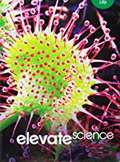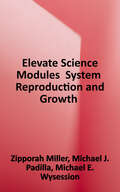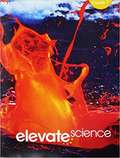- Table View
- List View
Elephants and Savanna Woodland Ecosystems
by Christina Skarpe Johan Du Toit Stein R. MoeDuring the nineteenth century, ivory hunting caused a substantial decrease of elephant numbers in southern Africa. Soon after that, populations of many other large and medium-sized herbivores went into steep decline due to the rinderpest pandemic in the 1890s. These two events provided an opportunity for woodland establishment in areas previously intensively utilized by elephants and other herbivores. The return of elephants to currently protected areas of their former range has greatly influenced vegetation locally and the resulting potential negative effects on biodiversity are causing concern among stakeholders, managers, and scientists.This book focuses on the ecological effects of the increasing elephant population in northern Botswana, presenting the importance of the elephants for the heterogeneity of the system, and showing that elephant ecology involves much wider spatiotemporal scales than was previously thought. Drawing on the results of their research, the authors discuss elephant-caused effects on vegetation in nutrient-rich and nutrient-poor savannas, and the potential competition between elephants on the one hand and browsers and mixed feeders on the other.Ultimately this text provides a comprehensive review of ecological processes in African savannas, covering long-term ecosystem changes and human-wildlife conflicts. It summarises new knowledge on the ecology of the sub-humid African savanna ecosystems to advance the general functional understanding of savanna ecosystems across moisture and nutrient gradients.
Elephants in Space
by Ben MooreThis book is about the history and future of life and the universe, written at a level that any educated lay-person can understand and enjoy. It describes our place in time and space, how we got here and where we are going. It will take you on a journey from the beginning of time to the end of the universe to uncover our origins and reveal our destiny. It will explain how mankind acquired this knowledge starting from the beginning of civilization when the ancient Greeks first began to ask questions about the nature of the world around them. Ben Moore takes us on a path of discovery that connects astrophysics with subjects as varied as biology, neuroscience and evolution; from the origin of atoms to how stars shine and die, from ants and elephants to space travel and extra-terrestrial life. But as our universe grows older and its stars fade away and stop shining, can life continue for eternity or is all life destined for complete extinction? And what is the purpose of all of this anyway?! On the German edition: "With his public talks and his new book "Elefanten im All" the Brit is on his way of becoming a popstar of science. Moore has a story to tell. The story of everything. From the beginning to the end of our existence. And he does so with esprit and catching passion. " Rico Bandle, Weltwoche, 1. November 2012 "The kind of book you come across only every few years. " Artur K. Vogel, Der Bund, September 2012.
Elephants on the Edge: What Animals Teach Us about Humanity
by G. A. BradshawDrawing on accounts from India to Africa and California to Tennessee, and on research in neuroscience, psychology, and animal behavior, the author explores the minds, emotions, and lives of elephants.
Elephants: Behavior and Conservation
by Shermin R. de SilvaThis volume compiles more than twenty years of behavioral research on the three living species of elephants in Africa and Asia (African Savannah, African Forest, and Asian elephant), together with their implications for conserving and managing wild elephant populations. The theoretical background, key terminology and findings are explained and presented in engaging language accessible to a wide range of non-specialists, from students to seasoned professionals. By viewing data from numerous studies through a comparative evolutionary perspective, the similarities and distinctions among species and populations come into clear relief, providing insight into the complexities of protecting these charismatic yet highly threatened mega-herbivores. Rather than mere exposition of what is known, readers are invited to reflect on the additional questions and puzzles that are still in need of answers, in the hope of inspiring a new generation of researchers and conservationists.
Elephants: Birth, Life, and Death in the World of the Giants
by Hannah Mumby“Walking with these elephants, and with Hannah, will appeal to the Planet Earth viewer and the Robert Macfarlane reader in equal measure.” —Dan Jones, New York Times–bestselling authorWhat Jane Goodall did for chimpanzees, international ecologist and conservation scientist Hannah Mumby now does for elephants in this compelling, eye-opening account that brings into focus this species remarkably similar to humans—and makes a persuasive argument for saving them.These extraordinary animals have so much to teach us, Mumby argues, and Elephants takes readers into their world as never before, revealing a society as complex as the chimpanzees, maybe even humans. Mumby’s exploration of elephant culture provides an empathetic, humanistic portrait of these majestic animals, illuminating their personalities, memories, and rich emotional lives. Mumby explains how elephants communicate with one another and demonstrates the connection between memory and trauma—how it affects individual elephants and their interactions with others in their herd. Elephants and humans, Mumby makes clear, are not very different. From emotional bonding to communication, human and elephant experience similarly nuanced lives, and the commonalities she uncovers are both surprising and heartwarming.Featuring a sixteen-page color insert of original photography, Elephants is a captivating, deeply moving exploration that offers a new way to look at these pachyderms and ourselves and a persuasive, passionate argument for rethinking our approach to animals and their conservation.
Elevate Elementary Science: Grade 5
by Scott ForesmanElevate Science is a comprehensive K-5 science program that focuses on active, student-centered learning. Elevate Science builds students' critical thinking, questioning, and collaboration skills. It fuels interest in STEM and creative problem solving while supporting literacy development for elementary-age learners.
Elevate Science Grade 4, Florida
by Michael J. Padilla Patricia Shehan Campbell Zipporah Miller Michael E. WysessionNIMAC-sourced textbook
Elevate Science Grade 7
by Michael J. Padilla Zipporah Miller Michael E. WysessionNIMAC-sourced textbook
Elevate Science Life
by Savvas Learning CoElevate Science takes science to a whole new level and lets you take ownership of your learning. Explore science in the world around you. Investigate how things work. Think critically and solve problems! Elevate Science helps you think like a scientist, so you're ready for a world of discoveries.
Elevate Science Modules Systems, Reproduction, and Growth
by Michael J. Padilla Zipporah Miller Michael E. WysessionElevate Science takes science to a whole new level and lets you take ownership of your learning. Explore science in the world around you. Investigate how things work. Think critically and solve problems! This book helps you think like a scientist, so you're ready for a world of discoveries.
Elevate Science [Grade 3]
by Michael Wysession Zipporah Miller Michael PadillaNIMAC-sourced textbook
Elevate Science, California Integrated, Grade 6, Segment 1
by Michael J. Padilla Zipporah Miller Michael E. WysessionNIMAC-sourced textbook
Elevate Science, California Integrated, Grade 6, Segment 2
by Michael J. Padilla Zipporah Miller Michael E. WysessionNIMAC-sourced textbook
Elevate Science, California Integrated, Grade 6, Segment 3
by Michael J. Padilla Zipporah Miller Michael E. WysessionNIMAC-sourced textbook
Elevate Science, California Integrated, Grade 6, Segment 4
by Michael J. Padilla Zipporah Miller Michael E. WysessionNIMAC-sourced textbook
Elevate Science, California Integrated, Grade 7, Segment 1
by Michael J. Padilla Zipporah Miller Michael E. WysessionNIMAC-sourced textbook
Elevate Science, California Integrated, Grade 7, Segment 2
by Michael J. Padilla Zipporah Miller Michael E. WysessionNIMAC-sourced textbook
Elevate Science, California Integrated, Grade 7, Segment 3
by Michael J. Padilla Zipporah Miller Michael E. WysessionNIMAC-sourced textbook
Elevate Science, California Integrated, Grade 7, Segment 4
by Michael J. Padilla Zipporah Miller Michael E. WysessionNIMAC-sourced textbook
Elevate Science, California Integrated, Grade 8, Segment 1
by Michael J. Padilla Zipporah Miller Michael E. WysessionNIMAC-sourced textbook
Elevate Science, California Integrated, Grade 8, Segment 2
by Michael J. Padilla Zipporah Miller Michael E. WysessionNIMAC-sourced textbook
Elevate Science, California Integrated, Grade 8, Segment 3
by Michael J. Padilla Zipporah Miller Michael E. WysessionNIMAC-sourced textbook
Elevate Science, California Integrated, Grade 8, Segment 4
by Michael J. Padilla Zipporah Miller Michael E. WysessionNIMAC-sourced textbook
Elevate Science, Course 1
by Michael J. Padilla Zipporah Miller Michael E. WysessionNIMAC-sourced textbook
Elevate Science, Course 1, Florida
by Michael J. Padilla Zipporah Miller Michael E. WysessionNIMAC-sourced textbook









